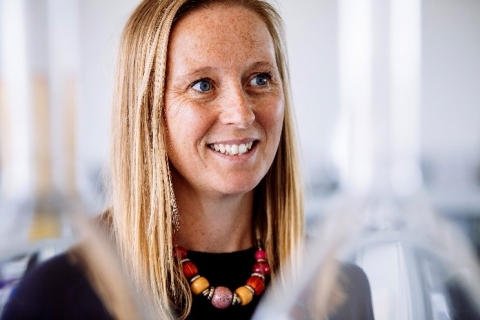

Professor Joanne Preston
Summary
Joanne Preston is a leading expert in coastal restoration ecology, based at the Institute of Marine Sciences, University of Portsmouth. Her Seascape Ecology and Restoration Lab group focuses on understanding relationships between biodiversity, structure and function of temperate coastal habitats, (such as oyster reefs, seagrass meadows and saltmarshes) and the ecological connectivity that occurs between them. Beyond increasing our understanding of ecological connectivity across the temperate seascape, this research hopes to advance the effective practice and scientific monitoring of ecological restoration of temperate seascapes, whilst informing policy.
Our coastal habitats have suffered significant and devastating losses over the last 50-200 years, and with this, we’ve lost the vital ecosystem services nature provides. Her research is helping to quantify the biodiversity and other ecological services provided by coastal habitats, such as water quality regulation, fish nursery function and carbon and nutrient storage, that are essential for human wellbeing and climatic regulation.
In 2017 she founded the UK/Ireland Native Oyster Network with the Zoological Society of London (ZSL), was a founding advisory board member for the European Native Oyster Restoration Alliance and currently leads its Monitoring Working Group. Working with a group of expert authors, Joanne edited a series of habitat restoration handbooks launched at COP26. She currently sits on the Oversight Panel for the Endangered Landscapes and Seascapes Programme (ELSP)
Professor Joanne Preston is scientific monitoring lead for the ELSP funded Solent Seascape Project and is working on projects for DEFRA, CEFAS and NERC (Sea the Value) to quantify and value the ecosystem services provided by coastal habitats. In 2022, Joanne co-led the first UK conference on ecological connectivity across the temperate seascape at the ZSL bringing habitat experts together to advocate a seascape approach to ecosystem restoration.
Since 2019 she has been awarded 8 grants, supervised 6 Phd students and authored over 30 scientific publications. She leads the University of Portsmouth Marine Ecology and Conservation degree module.
Biography
I studied Biology at the University of Sussex (1993-1996) followed by an MSc in Marine Resource Development and Protection at the Orkney based International Centre for Island Technology of Heriot-Watt University (1997-1998). During my Master's degree I worked at the Malaysian fisheries department researching the biodiversity of sponges in the Marine Park Pulau Payar.
After a brief spell as an environmental consultant for Emu Environmental Ltd (now Fugro Ltd), I was awarded a NERC-funded PhD at the University of Southampton. My PhD examined the evolutionary history of the gastropod Topshell genus Osilinus (now Phorcus, Donald et al. 2012) in the northeast Atlantic and Mediterranean. I went on to a post-doctoral research position at the Marine Biological Association of the UK working on a European project investigating anthropogenic impacts on European Genetic Marine Biodiversity (EUMAR) 2002-2005.
After a career break to have children I returned science as a Research Fellow at the University of Portsmouth on a molecular and microbial ecology research project to investigate microbial activity concerned with sulfur and iron cycling in timbers of the Mary Rose under different states of preservation (2010-2012). After another short career break I returned to a part-time lecturer position in Marine Biology in 2014, and became principal lecturer and course leader for BSc (Hons) Marine Biology in 2016.
Research interests
My core research interests are:
- Seascape Ecology & Restoration
- Biodiversity - structure - function relationships in temperate coastal habitats
- Molecular ecology approaches (e.g. eDNA)
- Ecological connectivity across temperate coastal habitats
- Restoration practice and policy relating to European Ostrea edulis reefs, Zostera & Nanozostera seagrass meadows and European saltmarsh
- Human impacts on coastal habitats
- Ecology and evolution of the native oyster Ostrea edulis
- Disease interactions and immunity in oysters
- Assessing ecosystem services & functions of coastal marine ecosystems: Blue Carbon Sequestration & Storage; Nutrient uptake & assimilation)
- Microplastic interactions with marine ecosystems
- Marine Invertebrate host-microbiome interactions
PhD Research Supervision
I welcome enquiries and applications from students wishing to be supervised in PhD projects broadly within the area of restoration ecology.
Teaching responsibilities
I am module lead for:
- Marine Ecology and Conservation U30000
Media availability
I am happy to take calls and emails from the media on my research, and am aware of the need to respond to journalists in a timely manner. Please contact me directly on joanne.preston@port.ac.uk.
Interested journalists can also contact the University's Media and Communications team for support and advice on all media engagement, including out of hours.
Research outputs
2024
Filtration behaviour of Ostrea edulis: diurnal rhythmicity influenced by light cycles, body size and water temperature
Fabra, M., Helmer, L., Morrall, Z., Preston, J., Watson, G.
15 Nov 2024, In: Estuaries and Coasts. 48, 20p., 18
Historical dataset details the distribution, extent and form of lost Ostrea edulis reef ecosystems.
Helmer, L. D., McCormick, H., Preston, J., Thurstan, R. H., zu Ermgassen, P. S. E.
5 Nov 2024, In: Scientific Data. 11, 9p., 1198
Records reveal the vast historical extent of European oyster reef ecosystems
Ashton, E. C., Bennema, F. P., Brown, J. H., Cameron, T. C., Cetinić, A. B., Da Costa, F., Donnan, D. W., Ewers, C., Fortibuoni, T., Galimany, E., Giovanardi, O., Grancher, R., Grech, D., Hayden-Hughes, M.,
3 Oct 2024, In: Nature Sustainability
Global patterns in seagrass leaf and sediment carbon isotope fractionation have implications for carbon provenance calculations in blue carbon accreditation
Cerasuolo, M., Preston, J., Ragazzola, F., Reynolds, S. E., Ward, E. A.
1 Oct 2024, In: Ecological Indicators. 167, 13p., 112546
